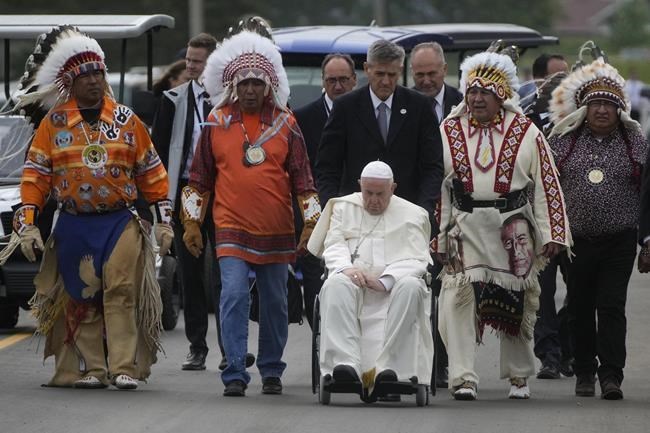Last week Pope Francis visited Canada in response to requests made earlier in the spring when various Indigenous leaders visited in the Vatican City. As someone who is neither Roman Catholic, nor particularly interested in any sort of apology from the Holy Father, I did not go out of my way to attend, or watch any of the events associated with this visit. It did not help that his visit was primarily limited to the Edmonton area, Québec City,and Iqaluit. Nevertheless, as someone who lived and taught in the Edmonton area for 20 years, and used to take students to Maskwacis and Lac Ste. Anne to learn about Indigenous history, I naturally have a lot of friends, both Indigenous and settler, who were quite interested in the visit, and my social media feed was quite full of people reacting to it. As such, I would like to provide the following reflections.
First, if it is not yet obvious to everyone, the Indigenous community is diverse, and reactions to the papal visit were equally varied. Many Indigenous people are Roman Catholic and naturally for them the entire thing was quite profound. Indeed, back in May I had a Métis colleague quite proudly show me the medal he received when he visited the Vatican City in the spring. That being said I was also quite entertained when a Mennonite friend jokingly asked what to do when Pope Francis hit him with holy water at Lac Ste. Anne last week. And true to form, my Lutheran friends were quick to point out that not only does the Pope not speak for all Christians, but that their church never ran residential schools in Canada.
And of course, I know many people who are not Christian, and see Christianity as an imposed religion, and anyone who follows it as colonized. It should come as no surprise that they were incredibly critical of the whole thing.
Second, given the diversity in the Indigenous community there was no way the Bishop of Rome could offer an apology that would make everyone happy. As in the spring, he refused to apologize for the entire Roman Catholic Church, instead focusing on individuals who were involved in the Indian residential school system. Given that he the monarch of the Vatican City, and the number of scandals that have plagued his church in recent decades, this sort of statement should come as no surprise.
He is limiting liability and you can bet his team discussed what he would say well in advance of his plane touching down in Edmonton. This legalistic approach no doubt also explains why he said nothing about the Doctrine of Discovery, missing and murdered Indigenous woman and girls, and other important topics. There simply was no good reason for him to talk about them, particular since any off-hand comment might have legal repercussions. That being said, it was striking to see that on his flight back home he stated that what happened at residential schools was genocide. In doing so he joins every other church that ran residential schools in condemning what happened there and was clearly stating those involved in the system were involved in genocide.
Third, it was interesting to see the conversations that emerged following the pope receiving a Plains headdress from Grand Chief of the Confederacy of Treaty 6 First Nations Wilton Littlechild. For those First Nations that wear this headdress, it is often seen as something that must be earned, and so questions were immediately asked whether the Supreme Pontiff deserved one. Of course, proponents of the gift pointed out that it comes with certain responsibilities, but that only raised the question of whether the pope knew that. The event also revealed a bit of the contention between the Nehiyawak (Cree) and Niitsitapi (Blackfoot Confederacy) as the latter have received criticism in the past for giving headdresses to various politicians, including the Prince of Wales.
And fourth, it is truly amazing to see what the government can do if they want to. Maskwacis is one of the largest Indigenous communities in Alberta, while Lac Ste. Anne regularly receives over 30,000 pilgrims a year. Yet, it took a papal visit for the Province of Alberta to make much needed repairs to the roadways leading to both, if not pave them for the first time.
And the work was completed in record time. If only politicians treated the rest of us like they did the pope.
Daniel Sims is an associate professor of First Nations Studies at UNBC.



